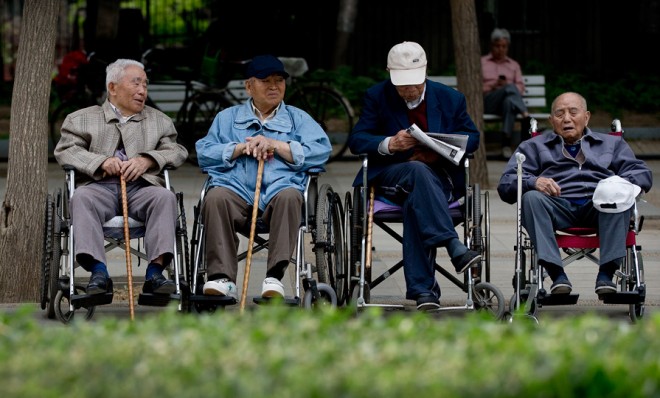In China, adults must visit their aging parents… or else
In the world's most populous country, it is now illegal to "neglect or snub elderly people"

A free daily email with the biggest news stories of the day – and the best features from TheWeek.com
You are now subscribed
Your newsletter sign-up was successful
Unlike in Boca Raton, elderly people in China now have a legal basis for forcing their children to visit them. Adult children who don't comply could suffer fines or jail time (along with the usual guilt trip).
The "Elderly Rights Law" states that adult children "should never neglect or snub elderly people" and should visit their parents "often," even if they live far away.
Many Chinese citizens are griping about the vaguely worded law, wondering what visiting "often" means and how exactly it will be enforced. Zhang Yan Feng, a lawyer with a Beijing law firm, told the BBC that the law could actually have some teeth:
The Week
Escape your echo chamber. Get the facts behind the news, plus analysis from multiple perspectives.

Sign up for The Week's Free Newsletters
From our morning news briefing to a weekly Good News Newsletter, get the best of The Week delivered directly to your inbox.
From our morning news briefing to a weekly Good News Newsletter, get the best of The Week delivered directly to your inbox.
It's hard to put this law into practice, but not impossible. If a case is brought to court on the basis of this law, I think it'll probably end up in a peaceful settlement. But if no settlement is reached, technically speaking, court rulings can force the person to visit home certain times a month. [BBC]
The increased urbanization of China has left millions of workers crammed in industrial cities like Shenzhen and Chengdu — far away from the rural homes where many of their parents still live (as documented in the movie Last Train Home).
The fragmentation of Chinese families comes at a time when millions of adults are becoming senior citizens. There are 185 million people aged 60 and over in China. By 2053, that number is expected to jump to 487 million — 35 percent of the population.
China's rapidly aging population will test its social safety net, especially considering the country's one-child policy. As the country gets older, the media has increasingly been filled with stories about adult children abusing their elders, including one involving a son forcing his 100-year-old mother to sleep in a pig sty.
While young people might complain on social media, some of China's senior citizens support the law.
A free daily email with the biggest news stories of the day – and the best features from TheWeek.com
"I think twice a year would be good," Wang Yi, whose two sons visit her once a year from hundreds of miles away, told the BBC. "We Chinese people raise children to take care of us when we are old."
Keith Wagstaff is a staff writer at TheWeek.com covering politics and current events. He has previously written for such publications as TIME, Details, VICE, and the Village Voice.
-
 How the FCC’s ‘equal time’ rule works
How the FCC’s ‘equal time’ rule worksIn the Spotlight The law is at the heart of the Colbert-CBS conflict
-
 What is the endgame in the DHS shutdown?
What is the endgame in the DHS shutdown?Today’s Big Question Democrats want to rein in ICE’s immigration crackdown
-
 ‘Poor time management isn’t just an inconvenience’
‘Poor time management isn’t just an inconvenience’Instant Opinion Opinion, comment and editorials of the day